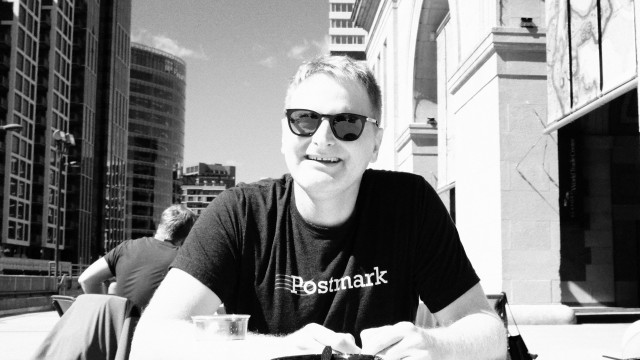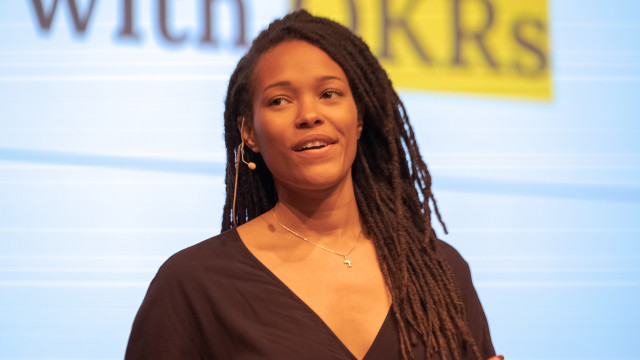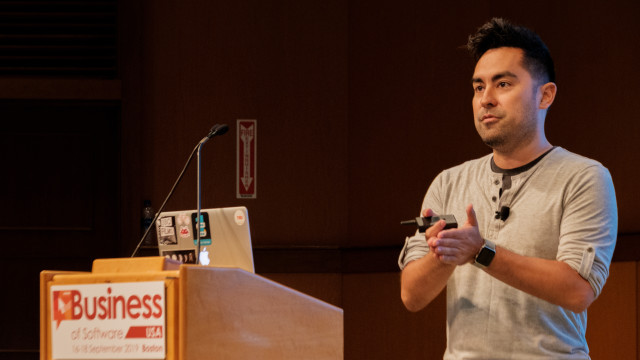Why do speakers attend BoS? And what do they learn?
Each year at the Business of Software Conference, attendees hear insights from some of the smartest people in software, all willing to share their expertise with the community. Over the last 13 years, hundreds of speakers have shared their experiences and wisdom with the BoS community. At #BoS2019 this September, Allison Grinberg-Funes sat down with speakers old and new to learn their thoughts on the BoS community and what it’s like to be a speaker.
Guest Post by Allison Grinberg-Funes

Speaker: Giacomo (Peldi) Guilizzoni
Company: Balsamiq
Title: Founder & CEO
What’s your relationship with BoS?
Peldi: Seeing the BoS talks was part of my inspiration back in 2007. I was starting to think of leaving my job and starting a company and was reading a lot of content. These videos from a new conference came out on a forum and they were amazing. It was like TED, but for us. It was refreshing because the content wasn’t about the typical Silicon Valley startups that try to grow super big. They talked about culture and the topics were aspirational.
It eventually became a goal to speak at Business of Software. I wanted to be part of this tribe, this community. My identity was shaped by this conference and I hoped that some day, I would be worthy of taking the stage.
At the time, my blog was becoming popular and I was invited to speak at Redgate to their offices. Afterward, I asked what I had to do to speak at BoS. Neil [Davidson, founder of Business of Software Conference] told me I should do a lightning talk and if it went well then I could return the following year. Turns out that I made an impression at the Redgate talk…because I got invited to speak the following year.
It was so scary. I worked on the talk for so long and to practice speaking in public and doing that talk, I said yes to everyone who invited me to speak. I spoke in Prague, Vienna, Lisbon, and I would evolve the talk depending on how people responded, so I would be ready for BoS. And I did it in 2010. It was one of the best talks I’ve done.
Now, as a speaker, I come every couple of years and talk about the mistakes I’ve made.
Why do you choose to talk about the mistakes?
Firstly, it’s important to focus on the mistakes to both work through them and to put them behind me. It also clarifies the problem because once you explain it, it begins to make more sense.
This community has always felt so intimate, safe, and welcoming. I share a lot here. I’ve always had some imposter syndrome. Coming here is hard because after the first couple talks, I feel others are so much more polished.
How do you approach that vulnerability?
I want people to feel like, “If this guy can make it, I can make it, too.”
You’ve been in the community for so long, and a lot has changed. What’re your thoughts on how things have changed and evolved with the community?
The community is getting older. A lot of us return over and over; some of us don’t return anymore – some have retired or moved on to other things. I would love to see more new entrepreneurs within the community. And I think that’s because there are less people taking the risk; it’s different than it was in 2008 because there was this opportunity to capture new markets and a lot of opportunity for venture-backed startups to be acquired by Apple, Facebook, Yahoo, Microsoft, etc. There was a lot of buzz there and now the bigger companies build things in-house and if they buy anything, they buy companies when they’re still one or two people.
What would you say to newer entrepreneurs who may be getting discouraged by those changes in opportunity?
Once you come here it’s pretty reassuring. You realize that you don’t have to be hot and trendy in order to be successful. In fact, sometimes that backfires. There are people here who have been very successful at things – for example, Moraware – they are the world leader, we’re talking global domination, of software for people that install kitchen countertops. It’s a 15-person company, it’s been around for 15 years, and they’re very successful. Last year there was a guy who made software for water boilers; yesterday at lunch I met someone at a 150-person company building software for special ed teachers.
We don’t make the news. But we make money. We support our employees, their families, our families. There’s so much out there that’s not “sexy” but impactful with an opportunity to be successful. This is the only place you meet these kind of people. They don’t have social media because they’re busy making their customers and employees happy. There’s nothing more wholesome than that.
For someone getting started, coming here gives you these examples where you can see yourself doing it, too. Some developers want to work for the next “big thing” and you won’t be able to hire them but you will be able to hire people who’ve done it. This conference serves a great purpose to give a home to a more mature, understated-but-enormous part of the software industry.
—

Speaker: Whitney O’Banner
Company: Medium
Title: Software Engineering Manager
What’s your background with BoS?
Whitney: Mark reached out to me on Twitter after seeing a talk I gave earlier this year in London and said I’d be perfect for the audience at BoS. From what he told me, it sounded like a great crowd and speaker line up. I watched a couple of the talks from last year and immediately thought about how I could make my talk fit for BoS.
What was your expectation based off of other conferences you’ve spoken at and attended?
This is nothing like what I expected, for a couple of reasons:
It’s much more intimate than I thought. A lot of the attendees know each other and have been coming for multiple years, so it feels more like a family reunion of sorts, than a software conference. I didn’t expect such a warm welcome from the audience and other speakers; everyone I talk to is super approachable.
As a speaker, I didn’t anticipate the Q&A and I’m so glad it happened because people had great questions. I’m working on exploring answering with “I don’t know” and exercising that.
Do you find all these sessions are applicable to you and your team? What are some takeaways?
Some of the sessions are directly related to the work I do. Others were more founder/entrepreneur focused so not directly applicable but I came in hoping to extract one thing I could translate into my working environment; I’ve been able to do that with each talk.
The talks that are applicable to my work have been most exciting.They also presented practical strategies. And it gave me more confidence as a speaker to see people before me being super vulnerable, conversational, and having a colloquial exchange with the audience.
How do you evaluate coming to speak at a conference?
The organizers have a large hand in it. I talk with them and learn what it is they’re trying to do and if they’re intentional about things like diversity of audience, perspective, and industries, then that’s a big thing. The topic of the conference is also important. I thought BoS was interesting because it’s more about the marriage of business and software. The software part is typical but the business part is inspiring.
To get perspective from someone else in another industry doing another type of work allows you to extract parallels between the work we each do. I can take aspects of the business and apply it to engineering.
How’d you get started as an engineer?
I got into it in college and felt like I was late to the game–I wasn’t building computers at age 7. I interned at Apple and my first full time role was as an engineer at Apple. It was intimidating because I was working with very smart people who had been programming since they were 7-years-old and I was able to identify the gaps that were missing for me. The biggest thing missing was a mentor.
How did you find a mentor?
Through affinity groups, an employee resource group at the company (e.g. Blacks at Apple) and there were older people in that group established in their careers that mentored me. The group recently created an award actually for the work that these mentors have done for people.
What are some of your BoS takeaways?
I mentioned earlier how tight-knit the community is and it’s tight-knit, but also remains very inclusive. People continue to come back to re-engage and reunite with other attendees. That was very new to me. I hadn’t experienced that at conferences in general. And that’s encouraging me to come back as an attendee.
I’m a hiring manager and so when it comes to best practices for hiring, I learned a lot from Dharmesh’s talk and also from a discussion with a group I had at lunch. I’m a manager but I’m full time remote. There’s a question of, how do you lead people remotely and still galvanize towards a shared goal or vision? Folks gave me some good best practices:
- Video chat is important
- To build trust, everything should be in video or in person to start if possible (not things like Slack)
- It’s important to hire for remote fit. I’ve given thought to it but in this conversation it was really driven home. There are a lot of folks who want to work-from-home but aren’t equipped to do so.
- We also discussed the transition from being a remote worker to working in an office and how to approach that situation.
I also loved Dharmesh’s points on narrowing the focus instead of broadening the market.
—

Speaker: Cesar Kuriyama
Company: 1SecondEveryday
Title: CEO & Founder
How did you hear about BoS and come to speak here?
Cesar: Schoneck, my co-founder, told me that he was thinking about going to this Business of Software Conference in Boston. Then he came and raved about it when he came back, with a bajillion takeaways. At that point, he sent me the talk by the founder of Zapier and there were a lot of takeaways, especially being a remote company. It’s hard to get Schoneck out of Austin, TX, so the fact that he wanted to come back to this conference really speaks volumes about the first experience.
How was your experience speaking?
It was exactly what Schoneck alluded to. The conference has been very actionable. I go to a lot of conferences throughout the year that are very fluffy and motivational and in my bubble, you see that a lot. I saw one of Peldi’s talks before I came and was mesmerized for the entire hour and he was speaking about exactly where we are as a company. I’m usually someone that just listens and doesn’t take notes but during his talk, but I was typing furiously.
Can you speak to takeaways from other talks this year?
There’s a bunch! The one that I’ve been thinking about the most is April’s talk on positioning. We do talk about that stuff but we don’t have a language around it. I’d never heard the term “positioning” but the way she explained it made perfect sense. Sometimes, we ask Should we say we’re a video journal? Movie maker? Life movie maker? Should we say we’re about memories? There are so many ways to describe what we do – and now we’re making a social feed, so how does that impact things? We don’t market so we haven’t been forced into figuring out these questions but we will soon. The idea of how to position ourselves in the market and how we talk about ourselves is something we need to begin working on.
A lot of speakers are talking about emotional subjects that require vulnerability. You yourself included a lot of daily seconds in your presentation that weren’t always positive. For the other entrepreneurs and founders in the audience, how do you think that as their journey in software progresses, that concept of recording the good and the bad comes in?
If you zoom out, there’s life and inside life is work, hobbies, etc. If I could tell long-ago-Cesar something, it would be that we often assume incorrectly that people want to have different categories for things in their lives. Ex: I want to start a timeline for my kid and another for myself. What I should’ve done is had everything be the same life and then be able to tag things as “life” as “kids”, etc. A couple years ago, I grabbed moments for example, that were just “work moments” and that is just a part of my bigger life. To be answering your question–I think people should be recounting their life and of course work is part of that. For me, it’s one giant Venn Diagram and things are intersecting in different ways. Being able to relive the ups and downs together instead of just the happy moments, creates better context for what is and what to expect in the future.
—
Videos from Business of Software Conference USA 2019 (including Whitney & Cesar’s talks) will be available soon. Don’t miss them – sign up for our newsletter below to be the first to know.
Allison Grinberg-Funes is a connection catalyst. That means she specializes in connection. She helps companies connect with their audience via storytelling, content strategy, & digital marketing. Keep up with her on Twitter here.
Learn how great SaaS & software companies are run
We produce exceptional conferences & content that will help you build better products & companies.
Join our friendly list for event updates, ideas & inspiration.